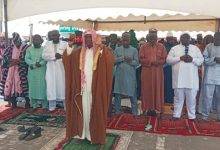
A science teacher from rural Kenya, who gives away most of his salary to support poorer pupils, has won a $1m prize (£760,000) for the world’s best teacher.
Peter Tabichi, a member of the Franciscan religious order, won the 2019 Global Teacher Prize.
Brother Peter has been praised for his achievements in a deprived school with crowded classes and few textbooks.
He wants pupils to see “science is the way to go” for their futures.
The award, announced in a ceremony in Dubai, recognises the “exceptional” teacher’s commitment to pupils in a remote part of Kenya’s Rift Valley.
He gives away 80 per of his pay to support pupils, at the Keriko Mixed Day Secondary School in Pwani Village, Nakuru, who otherwise could not afford uniforms or books.
“It’s not all about money,” says Brother Peter, whose pupils are almost all from very disadvantaged families. Many are orphaned or have lost a parent.
The 36-year-old teacher wants to raise aspirations and to promote the cause of science, not just in Kenya but across Africa.
On winning the prize, Brother Peter hailed the potential of Africa’s young population.
“As a teacher working on the front line, I have seen the promise of its young people – their curiosity, talent, their intelligence, their belief.
“Africa’s young people will no longer be held back by low expectations. Africa will produce scientists, engineers, entrepreneurs whose names will be one day famous in every corner of the world. And girls will be a huge part of this story.”
The award, in a competition run by the Varkey Foundation, has seen him beating 10,000 other nominations from 179 countries.
He is a Franciscan friar, a member of the Catholic religious order founded by St Francis of Assisi in the 13th Century.
Brother Peter says there are “challenges with a lack of facilities” at his school, including not enough books or teachers.
Classes meant to have 35 to 40 pupils are taught in groups of 70 or 80, which, he says, means overcrowded classrooms and problems for teachers.
The lack of a reliable internet connection means he has to travel to a cyber-cafe to download resources for his science lessons.
And many of the pupils walk more than four miles (6km) on bad roads to reach the school. –BBC






